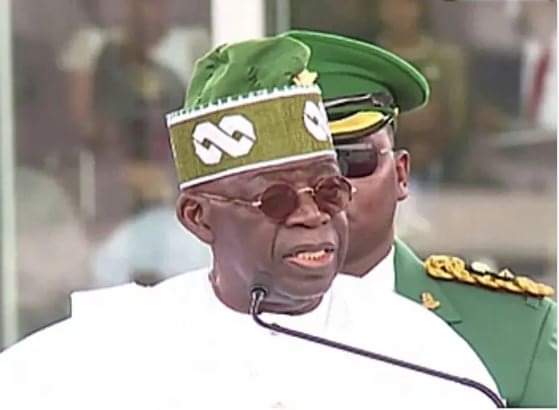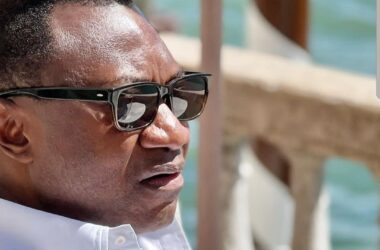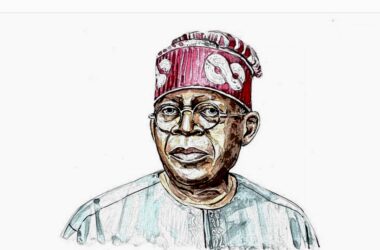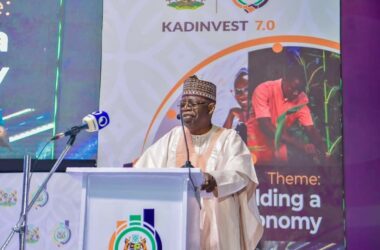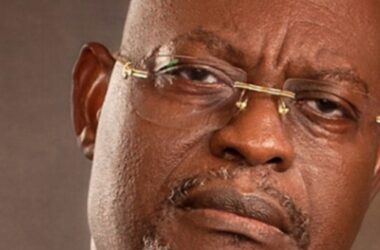How time flies when you’re having … well, maybe not exactly fun, if you are the President of Nigeria at this critical juncture. Being faced with the herculean task of turning around every single index of human development in our country (said indices being among the worst in the world) cannot be anybody’s idea of fun. And from their pronouncements and body language, the President and his team seem all too aware of this fact, judging from the short and brutal nature of the honeymoon period he has endured after his inauguration in May.
The President and his team are also aware of the passage of time – and the reckoning that critical stakeholders, including the media and the political opposition, as well as the more cognitive segments of the populace, make of an administration’s performance at the end of a given chronological milestone.
And now, with one hundred days gone, the preliminary assessments are already coming in – although, mercifully in President Tinubu’s case, these assessments have been tempered by understanding, even sympathy, among objective and perceptive observers and analysts – considering the parlous economy and security situation he inherited on his assumption of office. However, there have been no shortage of expectations and agenda-setting on the part of these stakeholders as to what priorities the Tinubu government should set, and what policies it should pursue, going forward.
In reality, 100 days (out of the 1, 461 days that make up a four-year presidential term) is an unreliable yardstick to gauge any government’s performance. Despite the attention now given to that milestone, there is nothing in any of our laws that gives any significance to a President’s first 100 days in office – reason simply being that there is nothing more important about a President’s first 100 days than any other time period in a presidential term. Still, in spite of being an arbitrary milestone, the 100-day marker has nevertheless become an important benchmark when the media, political analysts and academics consider how a new President’s administration is doing. The first 100 days often gives an indication of a President’s style, priorities, and the speed with which he is able to implement his campaign promises.
Like many political trends that have gained popularity in the modern world, the 100-day concept first came to public attention in the USA – precisely during the tenure of the country’s 32nd President, Franklin D. Roosevelt. On taking office in 1933 (in the midst of the Great Depression) he summoned the U.S. Congress to a three-month special session and, by the end of his first 100 days, passed a plethora of new laws aimed at easing the effects of the Depression. In his early days as President, Roosevelt usually gave daily radio “fireside chats” in which he spoke directly to the American people and explained how he was trying to solve the country’s problems. In one fireside chat, Roosevelt noted how busy and important his first 100 days had been – and that was how concept was born. Since then, subsequent US Presidents – and increasingly, democratically elected Presidents elsewhere around the world – have come to understand that they will be measured by how ambitious and successful their first 100 days in office are.
In a recent engagement ahead of the 100-day milestone, President Bola Tinubu acknowledged the enormity of the task ahead of him and his team, when he said that what his administration needed from Nigerians was not sympathy but patience, understanding and cooperation. ‘Don’t pity me, ‘ he reportedly said. ‘I asked for this job.”
The prevailing mood in the nation today, though, is not pity – far from it – but more of a mixture of anger (at the way things are), disillusionment and cynicism (about government’s ability and readiness to clean the proverbial Augean stable and to dig Nigeria out of the hole into which successive governments – and in particular, the immediate past administration of President Muhammadu Buhari, have put her.
Beyond the anger and cynicism, though, there is a ripple of excitement in certain quarters of the society at the actions that have been taken so far, as hurtful as they’ve been to the fortunes to the most vulnerable segments of society. Against the backdrop of the past eight years – when Nigerians had to cope with a President who, like the proverbial wise monkeys, did nothing, knew nothing, heard nothing, and was bothered about nothing – the actions of the Tinubu have so far portrayed an administration with a sense of urgency and some level ofconcern for its perception in the eyes of the populace, and for the ultimate and immutable verdict of history.
There seems, now, to be some understanding about the purpose of government, some acknowledgement that a leader is supposed to do just that: LEAD – first by designing a comprehensive strategy of engagement with both the issues and the people affected by them; second, by thinking through the appropriate policies for dealing with various problems; and third, by finding and deploying the right type of human capital for the implementation of these policies, based on competence and sensitivity to both the existing and subsisting, sociopolitical realities on ground. And then the leader must cap it all up by establishing or promoting a credible compliance system driven by cost-effective implementation, monitoring, evaluation, feedback, recalibration and re-engagement within a self-correcting framework. On those paradigms, the general consensus is that the previous administration performed poorly and delivered miserably. Tinubu seems determined not to replicate that woeful record.
Fortunately, the President seems to have, in his first 100 days in office, set out with some kind of broad strategic framework. It is on the basis of this framework (whatever it may entail in the short, medium and long terms) that analysts and stakeholders have weighed in, with their advice, advocacy and agenda-setting for the next four years. This framework, they suggest, must run on the path of equity, natural justice and good conscience. It must also note the right type of investment that will lead to national development, instead of merely recording expenditure on all manner of projects, expenditure that has neither positive impact nor tangible benefit on the people. After the horror of the past eight years, Nigerians agree, things simply must be done differently.
Beyond ‘hitting the ground running’, as the President pledged to do on inauguration day, the government must plan consciously and intentionally for national development with a holistic template and outlook that has more to do with sustainability. A good place to start would be in the area of human capital development. The educational system in Nigeria today is the ‘factory’ that produces human capital for the nation. There has to be robust investment in our educational sector, tailored towards the production of valuable humans characterised by their ability to use their heads, hands and hearts in equal measure, by their proficiency in vocational as well as academic and professional vocation, as well as their ability to maximize critical resources such as money, time and, most importantly, people.
It goes without saying that peace and security are vital towards development in all its ramifications. As we have learned painfully of late, nothing meaningful can be achieved in an environment of rancour and conflict. President Tinubu must see to the possibility of reviewing upwards the salaries of armed forces personnel and the prompt payment of pensions to retirees, and the acquisition of modern weaponry to help our forces combat the non-state actors and bandits who have brought our economy to its knees.
Youths are the strength of every society and should rightly be a point of focus for every responsible government. They constitute the largest demographic segment in Nigerian society, and yet they are routinely kept away from the front burner of decision-making. The volume of graduates turned out by our institutions is increasing annually, but the labour market is shrinking. Applicants seeking white-collar jobs increase the pressure on available vacancies, while the less-scruoulous among them embrac banditry, armed robbery, internet fraud, political thuggery and a host of other nefarious activities. The Tinubu administration needs to come up with empowerment programmes designed to encourage both the educated and not-so- educated youths to engage in profitable and sustainable occupations as they strive actualize their potential in life.
Before the discovery of crude oil in commercial quantities in 1956, agriculture was the nation’s economic mainstay, as it provided the country with both food and cash crops, and ensured self-sufficiency. The government of Pres. Tinubu has so far sent the right signals in terms of its engagement with the country’s farming community. Apart from supporting farmers, which it must by providing the necessary incentives as well as facilities that scale up the value-chain, the administration will also do well to put tight quality checks at every stage of programme implementation, and ensure that it embarks on periodic result and impact assessments.
The energy sector of the country’s economy needs a total overhaul. From the perspective of the consumer, this overhaul should translate into stability of supply, quality and prices of petroleum products. At the moment, most Nigerians are living in quiet desperation on account of current fuel prices, and from the look of things, it is hard to see how they will cope for long with N720 per litre. The Tinubu administration, therefore, must go to work quickly on its pledge to ensure local refining capacity that meets domestic consumption needs – be it to rehabilitate the four existing (but aging) refineries or facilitate the construction of new ones, with the active collaboration of private sector players. In the past, billions of dollare were expended on ‘turn-around maintenance‘ (TAM) of these aging behemoths but with nothing to show for it. Also, we obviously need more refineries. Nigerians consume at least 45 million litres a day, and the Dangote refinery, commissioned earlier in 2023 by the previous administration and now projected to begin production no later than 2024, will not produce more than 18m litres a day at present capacity.
Still on petroleum products, the Tinubu administration also needs to confront the problem of declining oil output. A recent report says that in July 2023, Nigeria lost N249bn as oil output – mostly as a result of theft. Meanwhile, the 2023 Budget was based on production and export of 2.3 million barrels per day (or 69 million barrels per month). This flies against the Organisation of Petroleum Exporting Countries (OPEC) assigned quota of 1.7 million per day or (51 million barrels per month). So in June, Nigeria exported 13.5 million barrels less than originally planned, and in July, it was 17.5 million barrels less than budgeted. The price of crude averaged $80 per barrel; meaning that $1.08bn was not earned in June and in July we generated a $1.40bn negative variance. In the final analysis, Nigeria has earned approximately $4bn LESS than we budgeted for in the first 100 days of the Tinubu administration.
The impact of this crude oil dollar revenue shortfall on the exchange rate of the naira against global currencies is pretty obvious.
Closely related to the conversation on petroleum (and the removal of subsidies thereof) is that on palliatives. Far from being the ‘innovative solutions’ the government touted them to be, the whole palliative programme is now being seen as another example of our culture of policy disarray. Just to recap, the major thrusts of the programme were as follows: N8,000 to be paid to 12 million households; 3000 buses running on gas to be acquired; 250,000 tons of food to be released from federal government silos; 235,000 tons of fertilisers to be supplied to farmers; FG to acquire and cultivate 500,000 hectares of land; distribution of 5 trucks of rice and N5 billion to each state, and so forth. These measures, say critical stakeholders, should have been taken before the removal of subsidies on petroleum – but better late, as they say, than never. The government must, implement this latest palliative regime in such a way as to prevent a repeat of the chaos and heartache of its 2020 pandemic-era precursor.
At the just-concluded NBA Conference in Abuja, the President promised an end to the practice of expending over 90% of the nation’s GDP on debt servicing, as well as wanton borrowing. For eight years, former President Buhari seemed to have demonstrated more faith in borrowing to finance government projects than in revenue generation. However, experience has shown that the key indices of a country’s progres – security, education, infrastructure, health services, transport, etc, – depend on government’s ability to generate sufficient revenue on its own, before turning to borrowing where necessary. Even then, such borrowing must be undertaken advisedly i.e. for investment (with the aim of repaying the loan at the shortest possible time); certainly not for consumption and sharing. Having publicly disavowed that tragic practice, the President must now go in the opposite direction and prioritise the maximization of the many revenue-generating resources we have in such abundance in our country.
Somebody once said, “You can’t bully reality.” Realities like prevailing economic conditions and principles respect nobody – be he pauper, prince or President. All of us will get disciplined, one way or another, by the laws of supply and demand. Unlike the air we breathe, economic resources are limited in supply, and so their allocation to areas and practices that would yield maximums demand a certain level of wisdom, smartness and creativity on the part of leaders and policymakers.
To build back a nation’s fortunes – just as to be a man – is not a day’s job; it will certainly not be accomplished in the first, second or third 100 days of any administration. Perhaps it will not even be accomplished throughout this presidential tenure. Faced with this reality, the President has rightly called on Nigerians to be patient and show forbearance, as some of his administration’s policies and plans will take some time to bear fruit. Granted, it will also take time for the atmosphere of anger, disillusionment and cynicism that hangs over our land like a malevolent cloud to lift. But if President Tinubu and his team show the wisdom, smartness and creativity that their jobs demand in these difficult times – and are seen to do so – they might well find huge and even unexpected reservoirs of patience and understanding (if not exactly pity) from the long-suffering people of this blessed but beleaguered nation of ours.


